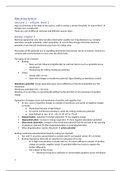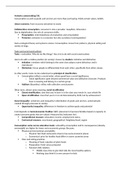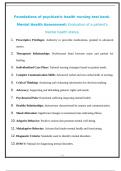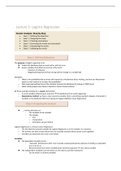Samenvatting
Ethics and the Future of Business
● Morality → Humans ability to distinguish wrong and right
- Ethics → The study of morality (an ongoing discussion about morality with a
very long history from the perspective of humans → anthropocentric)
- Ethical theories → Principles and rules that determine (bepalen) wrong and
right in different situations
- Normative ethics → The study of how we ought (zouden moeten) to behave
- Descriptive ethics → The study of how we actually behave
1. Morality → Ethics → Ethical theory → Potential solution to ethical
problems
● Business ethics → The study of business situations, activities and decisions where
issues of wrong and right are addressed (addresses challenging questions at
individual, organizational and societal levels)
● Do we need ethics when we have the law?
- In society, morality is the foundation of the law
- Law and ethics are overlapping (not every situation is ethical situation)
- Nonetheless → The law does not cover all ethical issues (cheating on your
partner), not all legal issues are ethical (driving on the right side of the road),
law and ethics can involve contradictions (apartheid)
● The Moral Machine (collecting data on how citizens would want autonomous
vehicles to solve moral dilemmas in the context of unavoidable accidents) → Every
culture is different (in one culture we prefer to spare the young rather than the old, or
prefer the fit than the less fit, or prefer men than women)
- There is variance in agreement across different dimensions, but the
dimensions that receive more agreement are → Sparing the young instead
of the elderly, sparing more characters instead of fewer characters, sparing
humans instead of pets
,● Cultural clusters (regarding the moral machine)
1. Western clusters → North America, many European countries (with
protestants, catholic and orthodox background)
- Sparing people over pets (low in southern clusters)
2. Eastern cluster → Japan, Taiwan, Indonesia, Pakistan and Saudi Arabia
3. Southern clusters → Latin America countries (south and central america)
and countries with a French influence
- Sparing the young and sparing higher status (low in eastern clusters)
- Sparing women and the fit characters
● Cultural and economic predictors of the moral machine preferences
- Participants from individualistic cultures (benadrukken de waarde van elk
individu) show a stronger preference for sparing the greater number of
characters. Participants from collectivistic cultures (respecteren de oudere
leden van de gemeenschap) show a weaker preference for sparing younger
characters
- Participants from countries that are poorer and suffer from weaker institutions
are more tolerant of pedestrians who cross illegally
● Normative ethical theories → What decisions should we make (how do we need to
act)
- Consequentialist theories (teleological) → Theories that base moral
judgements on the outcomes of a certain action (goal oriented). If the
outcome is desirable, the action is morally right (if the outcome is not
desirable, the action is morally wrong)
1. Ethical egoism and utilitarianism
- Principle-based theories (deontological) → Theories that base moral
judgements on the derivation of principles and the procedure by which they
are arrived at (prioritize what is right, rather than what is desirable)
2. Ethics of duties and rights and justice
● Ethical egoism → A theory that suggests that an action is morally right if in a given
situation all decision-makers freely decide to pursue either their (short-term) desires
or their (long-term) interests
- Thomas Hobbe, Adam smith and Ayn Rand
- This theory is inconsistent because violence and murder is fine, long as the
egoist needs are served (this is not moral)
- Application to self-driving car → If an ethical egoist is buying a car, she/he
would protect the people inside the car (if an ethical egoist is manufacturing
the car, she/he would likely aim to serve egoist customers to sell more cars)
● Utilitarianism (advantages compared with disadvantages for all persons who are
involved → cost/benefit analysis) → A theory which states that an action is morally
right if it results in the greatest amount of good to the greatest amount of people
affected by the action
- Jeremy Bentham and John Stuart Mill
1. Act utilitarianism → Base the moral judgment on the amount of
pleasure and the amount of pain a single action causes (whether a
, single act is right or wrong depends on the amount of common good it
produces)
2. Rule utilitarianism → Ask whether the underlying principles of an
action produce more pleasure than pain for society in the long run
(focuses on creating rules that produce the most common good)
- This theory is subjective and difficult to compare between people (we might
also think about the long and short term → idea of reciprocity)
- Application to self-driving car → According to act utilitarianism, you should
conduct a cost/benefit analysis of what causes the most benefit or least harm
in each situation. A utilitarian would aim to harm as few as possible (self‐
driving vehicles should minimize casualties. They should be introduced only if
they are likely to make driving in general safer)
● Ethics of duty → Ethical theories that consists of abstract, unchangeable obligations
(verplichtingen), defined by a set of rationally deduced a priori moral rules, that
humans should apply to all relevant ethical problems (regardless of the outcome of
the action)
- Immanuel Kant (he proposed that one should always act according to
principles that one would want everyone to follow universally)
- Imagine you could save someone by telling a lie. According to deontological
ethics, it would still be wrong to lie, even if the lie would save that person.
This is because lying violates the moral duty to tell the truth, and according to
Kant, you must always act according to principles that you would want to be
universally followed (the action self is wrong)
- This theory is a rather difficult and abstract theory (too much focus on the
principles)
- Application to self-driving car → We should determine general rules that
apply to all. For example, if the owner of the car is seen as responsible for the
consequences of it, then the persons inside the car should be sacrificed
● Rights and justice (natural human rights) → Are certain basic, important, and
unconditional entitlements that should be respected and protected in every single
situation. These are based in human dignity and lead to a duty for others to protect,
respect, and support them (right to life, freedom, property, speech, privacy,
conscience and fair trial among others)
- John Locke and John Rawls (rights‐based thinking are a central part of
Western political and ethical thought and the foundation of universal human
rights)
- This theory and the most lists of basic rights can be seen to be relatively
arbitrary. Rights are criticized as being too Western and/or neo-colonial
- Application to self-driving car → We can neither discriminate by age,
gender, physical appearance or status, nor can we take someone’s life for
crossing on a red light (from a justice perspective, the entire traffic systems
needs to be fair in considering, those who cannot afford a car and that
individuals should not be able to change settings to protect themselves)
Ethics and the Future of Business
● Morality → Humans ability to distinguish wrong and right
- Ethics → The study of morality (an ongoing discussion about morality with a
very long history from the perspective of humans → anthropocentric)
- Ethical theories → Principles and rules that determine (bepalen) wrong and
right in different situations
- Normative ethics → The study of how we ought (zouden moeten) to behave
- Descriptive ethics → The study of how we actually behave
1. Morality → Ethics → Ethical theory → Potential solution to ethical
problems
● Business ethics → The study of business situations, activities and decisions where
issues of wrong and right are addressed (addresses challenging questions at
individual, organizational and societal levels)
● Do we need ethics when we have the law?
- In society, morality is the foundation of the law
- Law and ethics are overlapping (not every situation is ethical situation)
- Nonetheless → The law does not cover all ethical issues (cheating on your
partner), not all legal issues are ethical (driving on the right side of the road),
law and ethics can involve contradictions (apartheid)
● The Moral Machine (collecting data on how citizens would want autonomous
vehicles to solve moral dilemmas in the context of unavoidable accidents) → Every
culture is different (in one culture we prefer to spare the young rather than the old, or
prefer the fit than the less fit, or prefer men than women)
- There is variance in agreement across different dimensions, but the
dimensions that receive more agreement are → Sparing the young instead
of the elderly, sparing more characters instead of fewer characters, sparing
humans instead of pets
,● Cultural clusters (regarding the moral machine)
1. Western clusters → North America, many European countries (with
protestants, catholic and orthodox background)
- Sparing people over pets (low in southern clusters)
2. Eastern cluster → Japan, Taiwan, Indonesia, Pakistan and Saudi Arabia
3. Southern clusters → Latin America countries (south and central america)
and countries with a French influence
- Sparing the young and sparing higher status (low in eastern clusters)
- Sparing women and the fit characters
● Cultural and economic predictors of the moral machine preferences
- Participants from individualistic cultures (benadrukken de waarde van elk
individu) show a stronger preference for sparing the greater number of
characters. Participants from collectivistic cultures (respecteren de oudere
leden van de gemeenschap) show a weaker preference for sparing younger
characters
- Participants from countries that are poorer and suffer from weaker institutions
are more tolerant of pedestrians who cross illegally
● Normative ethical theories → What decisions should we make (how do we need to
act)
- Consequentialist theories (teleological) → Theories that base moral
judgements on the outcomes of a certain action (goal oriented). If the
outcome is desirable, the action is morally right (if the outcome is not
desirable, the action is morally wrong)
1. Ethical egoism and utilitarianism
- Principle-based theories (deontological) → Theories that base moral
judgements on the derivation of principles and the procedure by which they
are arrived at (prioritize what is right, rather than what is desirable)
2. Ethics of duties and rights and justice
● Ethical egoism → A theory that suggests that an action is morally right if in a given
situation all decision-makers freely decide to pursue either their (short-term) desires
or their (long-term) interests
- Thomas Hobbe, Adam smith and Ayn Rand
- This theory is inconsistent because violence and murder is fine, long as the
egoist needs are served (this is not moral)
- Application to self-driving car → If an ethical egoist is buying a car, she/he
would protect the people inside the car (if an ethical egoist is manufacturing
the car, she/he would likely aim to serve egoist customers to sell more cars)
● Utilitarianism (advantages compared with disadvantages for all persons who are
involved → cost/benefit analysis) → A theory which states that an action is morally
right if it results in the greatest amount of good to the greatest amount of people
affected by the action
- Jeremy Bentham and John Stuart Mill
1. Act utilitarianism → Base the moral judgment on the amount of
pleasure and the amount of pain a single action causes (whether a
, single act is right or wrong depends on the amount of common good it
produces)
2. Rule utilitarianism → Ask whether the underlying principles of an
action produce more pleasure than pain for society in the long run
(focuses on creating rules that produce the most common good)
- This theory is subjective and difficult to compare between people (we might
also think about the long and short term → idea of reciprocity)
- Application to self-driving car → According to act utilitarianism, you should
conduct a cost/benefit analysis of what causes the most benefit or least harm
in each situation. A utilitarian would aim to harm as few as possible (self‐
driving vehicles should minimize casualties. They should be introduced only if
they are likely to make driving in general safer)
● Ethics of duty → Ethical theories that consists of abstract, unchangeable obligations
(verplichtingen), defined by a set of rationally deduced a priori moral rules, that
humans should apply to all relevant ethical problems (regardless of the outcome of
the action)
- Immanuel Kant (he proposed that one should always act according to
principles that one would want everyone to follow universally)
- Imagine you could save someone by telling a lie. According to deontological
ethics, it would still be wrong to lie, even if the lie would save that person.
This is because lying violates the moral duty to tell the truth, and according to
Kant, you must always act according to principles that you would want to be
universally followed (the action self is wrong)
- This theory is a rather difficult and abstract theory (too much focus on the
principles)
- Application to self-driving car → We should determine general rules that
apply to all. For example, if the owner of the car is seen as responsible for the
consequences of it, then the persons inside the car should be sacrificed
● Rights and justice (natural human rights) → Are certain basic, important, and
unconditional entitlements that should be respected and protected in every single
situation. These are based in human dignity and lead to a duty for others to protect,
respect, and support them (right to life, freedom, property, speech, privacy,
conscience and fair trial among others)
- John Locke and John Rawls (rights‐based thinking are a central part of
Western political and ethical thought and the foundation of universal human
rights)
- This theory and the most lists of basic rights can be seen to be relatively
arbitrary. Rights are criticized as being too Western and/or neo-colonial
- Application to self-driving car → We can neither discriminate by age,
gender, physical appearance or status, nor can we take someone’s life for
crossing on a red light (from a justice perspective, the entire traffic systems
needs to be fair in considering, those who cannot afford a car and that
individuals should not be able to change settings to protect themselves)











